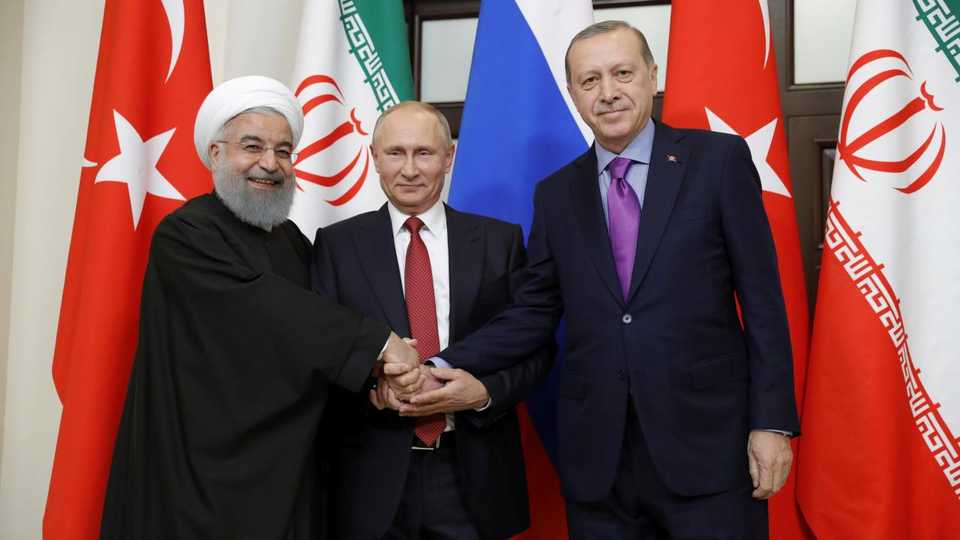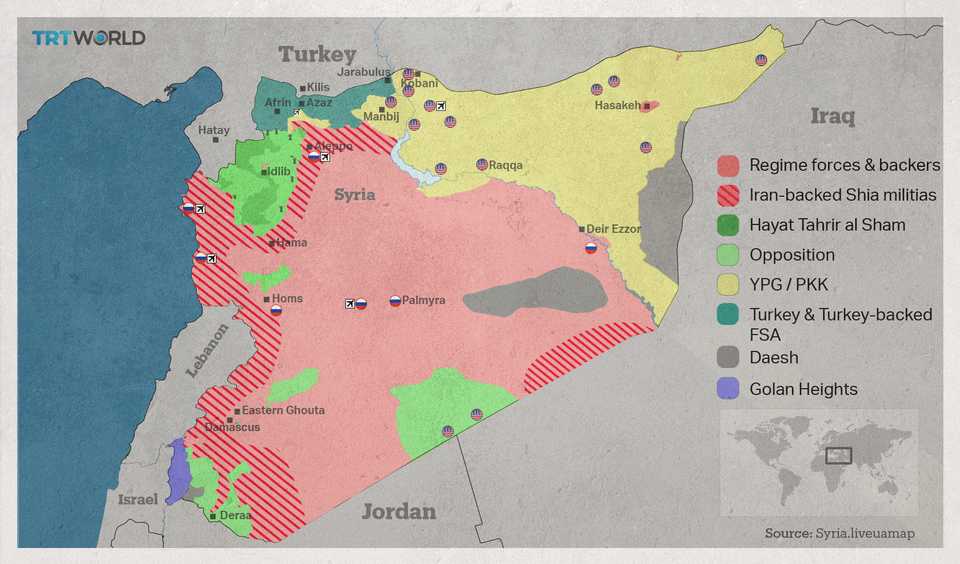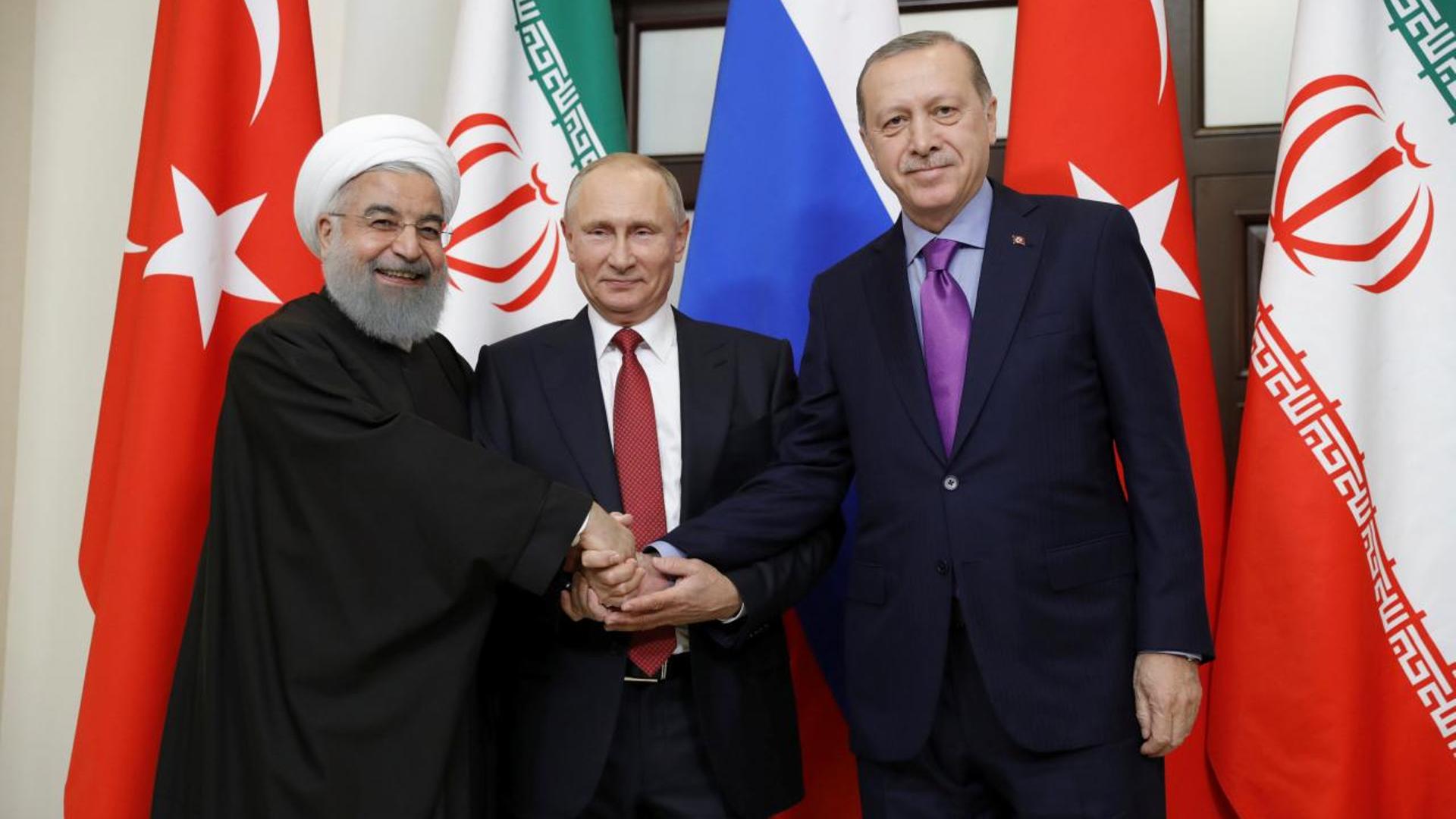
As Turkey’s Afrin operation nears its end and Russia continues to strike deals with various groups in remaining opposition and rebel pockets in Syria, the presidents of Turkey, Russia and Iran are holding a summit meeting in Ankara on Wednesday as part of the latest talks on Syria’s future.
The April 4 talks bring together Turkey’s President Recep Tayyip Erdogan, his Russian counterpart Vladimir Putin, and President Hassan Rouhani of Iran. They are the latest high-level talks the heads of the three countries have held, and follow preparatory talks their foreign ministers recently had in the Kazak capital Astana. The three presidents first met to discuss the future of Syria on November 22 in Sochi.
In addition to discussions regarding the de-escalation zones, eastern Ghouta and Afrin, as laid out in the previous talks, zones of influence and the political future of the country are likely to be on the agenda.
The meeting comes at a difficult time for Russia, which is under intense international scrutiny following an alleged chemical attack in the UK against Russian former double agent Sergei Skripal and his daughter.
The US, UK and several other EU countries have expelled dozens of Russian diplomats from their countries following the events.
While Turkey has maintained its close relations with Russia during this period, they continue to have significant disagreements regarding the future of Syria.

A federal vs unitary Syria
One of the main items on the agenda will be the political system of Syria after the war, an issue over which there are significant disagreements among the actors.
Turkey supports unity and territorial integrity of Syria, and is opposed to proposed federal systems or autonomous regions, particularly those that would lend the YPG any semblance of self-rule.
The YPG is the Syrian branch of the PKK, designated a terror organisation by Turkey, the US and EU. It has been fighting the Turkish state for several decades, and Turkey considers an autonomous YPG-held territory a threat to its own territorial integrity.
Meanwhile, Russia has played a delicate balancing game with the YPG/PKK as part of its overall Syria strategy, accepts it as a legitimate actor and maintains its support for a federal system.
Turkey has rejected Russia’s attempts to include the YPG/PKK in political talks regarding Syria, though Russia continues to push for its inclusion.
Russian foreign minister Lavrov said on Thursday, “We strongly believe that not a single conflict in areas where Kurds live can be settled without the Kurdish people.”
A senior Russian diplomat told TRT World that Moscow still believes a federal system might be possible in Syria’s future “if the Syrian people agree with that kind of a governing system.”
When asked about the PYD’s representation in any of these federal ruling bodies, his answer was, “If the Syrian people want that, why not?”
Spheres of influence
After years of warfare, the end game in Syria became increasingly shaped by external actors.
The main actors project their spheres of influence on the ground through proxies.
“Until there is a political settlement, Syria will look like a bigger version of what Berlin looked like after the Second World War, with different outside powers controlling different parts of the country,” Director of the German Marshall Fund’s Ankara Office Ozgur Unluhisarcikli told TRT World.
“So there would be a Russian-controlled part of Syria, an American-controlled part of Syria, a small but growing Turkish-controlled part of Syria.”
Russia
The Syrian regime’s main backer, Russia, continues to hold sway over much of Syrian territory. Although the Astana trio made deals to help de-escalate the violence in four opposition-held territories, the regime and its backers continue their bombardment of opposition areas, including Idlib and eastern Ghouta.
Idlib is the biggest region under opposition control, split between FSA, other moderate opposition groups and Hayat Tahrir al Sham (HTS), an internationally designated terrorist organisation that previously had ties to Al Qaeda. The regime and its backers use the presence of the HTS as an excuse to launch attacks on Idlib, although some of their attacks are directed towards civilians and moderate opposition areas.
Eastern Ghouta was the last opposition-held area near Damascus. The capital had been under siege for over five years. The siege came to an end after Russia brokered a deal between two of the opposition groups controlling the area to surrender and to leave the enclave with civilian residents.
Russia and the regime are aiming to reclaim most of the opposition-held areas before they start talks about a political transition period, since the war is coming to an end.
Thousands of Syrian residents were forced out of their homes into tent camps in Idlib in the north. The mass evacuation began on March 22, after weeks of intense aerial bombardment that caused more than 1,500 deaths.
While Russia said that remaining civilians and fighters would be protected, it continues its air strikes in the areas, so the civilians feel it’s not safe to stay in Ghouta, saying the evacuation is rather a forced displacement.
The town of Douma is the only region where a deal had not been struck. Russia announced that it had reached a deal with the rebels there, while Jaish al Islam, the group controlling the town continues to deny such a deal.
Iran
Iran-backed militias, including Hezbollah, continue their presence primarily on the ground near Idlib and along the borders of Syria.
Despite being backers of the regime along with Russia, there have also been more disagreements between the two countries as the war enters its end game.
In January, as Turkey moved to create observation posts in opposition-held Idlib as part of the de-escalation agreements, a Turkish convoy came under attack by what the Turkish government called terrorists.
The attack came from regions held by Iran-backed militias. After the attack, Turkish President Erdogan called Russian President Putin who then called Iranian President Rouhani. And the attacks eventually stopped.
The Russian official, who pointed out that Iran-backed militias were on the ground while Russia was active in air operations, said that Russia also needed to be on the ground in Idlib, which is why the three countries agreed on establishing observation posts in the region.
Turkey and Turkey-backed FSA
In northern Syria, the Turkish Armed Forces and the Turkey-backed FSA are slowly wrapping up Operation Olive Branch to clear Afrin of the YPG/PKK. The operation, which has connected the Euphrates Shield region with Afrin has created a Turkey and FSA-held region that also effectively functions as a buffer zone between the YPG-occupied territory in northwest Syria and Turkey.
Meanwhile, Turkey has repeatedly warned that Turkey could extend the operation into Manbij, west of the Euphrates, where there is also a US troop presence. The US and Turkey started holding talks in February in an effort to start normalising relations after a period of high tensions. The first visit by then-US secretary of state Rex Tillerson in February included talks for creating a mechanism to “dilute” the YPG’s control in the region, but it remains unclear whether the recent cabinet changes in Washington will change the course of this broad understanding.
US-backed YPG/PKK
The US-backed YPG continues to have a presence in northern Syria. Recently, a new political party was launched in Syria’s YPG-held areas, which includes PYD members, signalling the US’ newest strategy for the area.
In addition to maintaining a military and special forces presence in northern Syria, the US has also supplied the YPG with armament, training, technical and logistical support that has helped the militant organisation overtake large swaths of land in the region, despite intense objections from NATO ally Turkey.










Discussion about this post